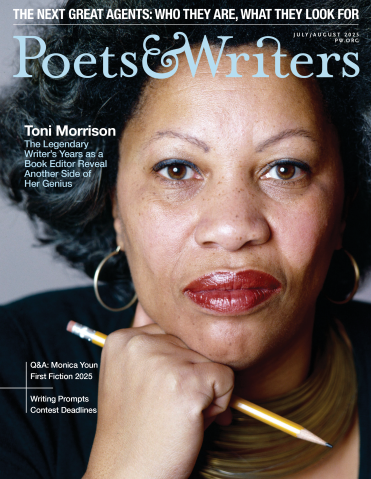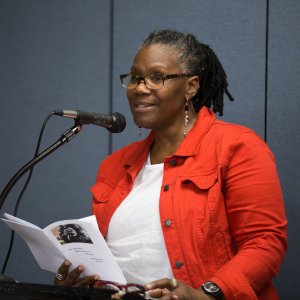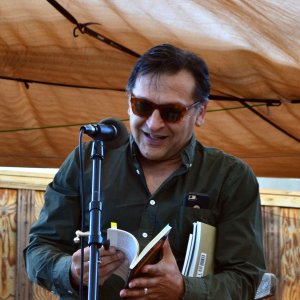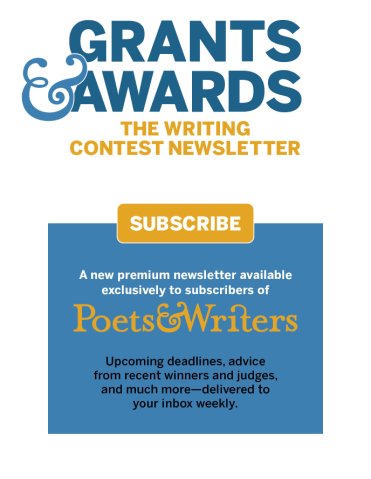Digital audiobook sales, which have been the primary driver of sales since Spotify entered the market in November 2023, sank in April, Publishers Weekly reports. Total revenue across 1,325 publishers saw a 4 percent overall decline compared to April 2024 due, in part, to a 12.5 percent drop in digital audiobook sales across both the adult and children’s/YA categories. Adult trade fiction digital audio sales dropped 9 percent in April, and adult nonfiction digital audio sales dropped 17.6 percent.
Writing Prompts
-
“It was all so different than he expected. / For years he’d been agnostic; now he meditated. /...
-
In the essay collection Exophony: Voyages Outside the Mother Tongue, translated from the...
-
In award-winning Palestinian American poet and novelist Hala Alyan’s debut memoir, I’ll Tell...
Tools for writers
Daily News
Citing the recently published book Toni at Random: The Iconic Writer’s Legendary Editorship (Amistad, 2025) by Dana A. Williams, Clint Smith writes for the Atlantic about how Toni Morrison transformed publishing as an editor at Random House. Smith writes: “How Morrison handled the pressures of wielding her one-of-a-kind influence is fascinating—and, in retrospect, telling: As an editor, she was not just tenacious, but also always aware of how tenuous progress in the field could be…. Morrison’s mode was to be relentlessly demanding—of herself, her authors, and her Random House colleagues. She tailored her rigorous style to the varied array of Black writers she didn’t hesitate to pitch to her bosses.”
A new prize for translated poetry has been launched by Fitzcarraldo Editions, Giramondo Publishing, and New Directions, the Guardian reports. The biennial Poetry in Translation Prize will award an advance of $5,000 to be shared equally between the poet and translator. The winning collection will be published in the U.K. and Ireland by Fitzcarraldo Editions, in Australia and New Zealand by Giramondo, and in North America by New Directions. Submissions are open from July 15 to August 15 to poets writing in any language other than English. The winner will be announced in January 2026 and publication of the winning collection is scheduled for 2027.
NetGalley has launched a consumer marketing platform called Booktrovert, Publishers Weekly reports. Booktrovert will offer e-book giveaways, reader activities, promotional and preorder campaigns, purchase links, and more. The platform will target general readers as opposed to industry professionals. Publishers will be able to create campaigns through a self-service interface within their NetGalley accounts and receive customer analytics and demographic data.
Authors are posting videos of themselves editing their manuscripts on TikTok to refute allegations that they are using generative AI and to bring readers into the drafting process, Alana Yzola reports for Wired. “The publishing market is expected to grow by $18.9 million between now and 2029, according to market research firm Technavio, partially due to an influx of self-published authors,” Yzola writes. “But with scammy rewrites and digitally fabricated authors entering the market, artificial intelligence has made searching for human-made content more difficult, causing independent authors to combat what some are calling an AI-generated ‘witch hunt.’”
BookTok has had multiple controversies in the last month: accusations of plagiarism, AI use, and author bullying, NBC News reports. Beverly, a romance novel by author Laura J. Robert, had been gaining traction on BookTok, but many content creators removed their positive endorsements of the book after allegations that Robert had plagiarized R.J. Lewis’s 2016 title, Obsessed. The author Victoria Aveyard recently posted a video alluding to another author using generative AI in a novel but did not name the writer. And Author Ali Hazelwood was cyberbullied after making a comment about who Katniss Everdeen, the protagonist of the Hunger Games series, should have ended up with romantically.
Five years after it was discontinued along with the industry trade show BookExpo, BookCon will return to New York City’s Javits Center next April, according to ReedPop, a boutique arm of events organizer Reed Exhibitions. Jim Milliot of Publishers Weekly reports that Jenny Martin, “who headed up the earlier iteration of BookCon as well as BookExpo,” will serve as event director. Milliot writes: “Martin stressed that the revived event will bear no resemblance to BookExpo, an industry trade show, saying that the BookCon team is ‘focused wholly on delivering a consumer event.’”
PEN America has compiled “A Travel Ban Reading List” that includes more than fifty titles “by authors with ties to the 19 countries affected by President Trump’s travel ban.” Sabir Sultan, director of the World Voices Festival and Literary Programs at PEN America, writes, “Writers record their ideas, their fantasies, and mirror our collective realities. Through engaging with books we learn about ourselves and the world. We see clearer the complex tapestry of people, histories, and national borders that shape our daily lives. We are inspired to see new possibilities. Let this list inspire you to read and explore.”
A book publisher that was launched in 2023 to take advantage of the success of #BookTok, appears to be closing, the Bookseller reports. 8th Note Press, which is owned by Chinese tech company ByteDance, had acquired the rights to more than thirty novels and also announced a print publishing arm in partnership with Zando, the independent publishing company that recently acquired Tin House. However, Matilda Battersby of the Bookseller writes, “[A]uthors and agents are currently negotiating the return of rights to titles acquired by the publisher, and the business’ digital presence has apparently been quietly deleted.”
Sourcebooks, the sixth-largest book publisher in the United States, made the list of the Best Workplaces of 2025, according to Inc. magazine, whose editors took into account “benefits, growth opportunities, and team values,” among other qualities, to compile the list.
Clare Mulroy writes for USA Today about how the Trump administration could change the way we read—from book bans to border policies and anti-DEI efforts that affect authors. Mulroy describes authors who, shaken by new immigration and border policies, are canceling tours and events in the U.S., budget cuts that have affected libraries and other public humanities programs, and legal actions that permit educational censorship and book bans.
The writer Henrique Alvarellos has overseen the reproduction of a groundbreaking book of Federico García Lorca’s homoerotic sonnets, the Guardian reports. In 1983, dozens of selected readers received the first edition of the Sonnets of Dark Love, a red booklet of poems penned by Lorca fifty years earlier. The people behind the publication never revealed their identities. But their plan to pressure Lorca’s family into releasing the poet’s sonnets in the original Spanish worked. A year after the secret publication, which was sent to Lorca experts, cultural figures, and journalists, Lorca’s family consented to the publication of all the sonnets. To commemorate the anonymous project, Alvarellos has produced a facsimile edition of that 1983 booklet.
Joshua Rothman writes for the New Yorker about how AI may bring the age of traditional reading to an end. He traces a history through various technological developments like e-books and audio narration, writing, “The old-fashioned, ideal sort of reading—intense, extended, beginning-to-end encounters with carefully crafted texts—has become almost anachronistic.” Rothman wonders, “What will happen to reading culture as reading becomes automated?” In such a world, he writes, “It will be difficult to separate the deep readers from the superficial ones…. Text may get treated like a transitional medium, a temporary resting place for ideas.”
Kelly Jensen writes for Book Riot about the Government Accountability Office’s conclusion that Trump overstepped his authority by dismantling the Institute for Museum and Library Services (IMLS). The Government Accountability Office, an independent, nonpartisan agency of the U.S. legislative branch that audits the federal government, found that the Trump administration violated the 1974 Impound Control Act (ICA), a tool of federal checks and balances that requires the president to execute legislation that Congress passes. Violations of the ICA are liable to legal action by the U.S. Comptroller General.
Katya Zimmer writes for the BBC about the trend of people turning to “creative bibliotherapy”—tailored reading recommendations with the goal of improving mental health. Zimmer cites studies that find immersion in great literature can “help relieve, restore, and reinvigorate the troubled mind—and can play a part in relieving stress and anxiety,” but she also concedes that “the evidence that reading helps mental health is complicated.” Though readers tend to be less stressed, depressed, and lonely than non-readers, it is unclear if reading fiction improves well-being, or if people with better well-being are the ones reading fiction in the first place. What is more, some research points to the fact that books can actually trigger readers with the same addictions as the characters they are reading about. Yet another study found that people with depression reported better mental health after attending reading groups for poetry and fiction.
Daniel Gumnit has been appointed executive director and CEO of Little Free Library, a nonprofit organization that is based in Saint Paul and dedicated to expanding book access, Publishers Weekly reports. Gumnit has previously served in leadership roles at nonprofits such as People Serving People, Twin Cities PBS National Productions, Children’s Cancer Research Fund, and most recently, Minnesota Alliance with Youth. In a statement, Gumnit said, “Our work—providing 24/7 book access; granting Little Free Libraries to underserved urban, rural, and Indigenous communities; and championing diverse books—has never been more urgent.”
Ellen Oh reflects on the tenth anniversary of We Need Diverse Books in an interview with Publishers Weekly. She discusses the organization’s advocacy for sustainable diversity in all parts of the publishing industry, book banning, and the Trump administration’s assault on DEI initiatives, among other topics.
The New York Public Library has announced Alexander Sammartino as the winner of the twenty-fifth annual Young Lions Fiction Award for his book Last Acts (Simon & Schuster). Sammartino will receive $10,000.
Keith Woodhouse writes about an emerging literary subgenre he calls “climate assessment dramas,” Stephen Markley’s The Deluge (Simon & Schuster, 2023), and the future of climate fiction for Public Books. “Narrativizing climate change means writing about environmental catastrophe in a way that cuts against the grain of established environmental commitments,” he writes, “it means imagining unprecedented political dynamics from within the limits of our own political moment, and it means describing a near-totalizing phenomenon through what is inevitably a narrow aperture.”
Nearly a million books in 254 languages from Harvard University’s library and troves of old newspapers and materials held by the Boston Public Library are being released to tech companies for AI training, the Associated Press reports. Jessica Chapel, the chief of digital and online services at the Boston Public Library, said, “OpenAI had this interest in massive amounts of training data. We have an interest in massive amounts of digital objects. So this is kind of just a case that things are aligning.” Digitizing is expensive, and tech companies can essentially fund projects librarians want to pursue anyway while benefiting from scores of valuable data.
Literary Events Calendar
- June 25, 2025
Writers' Room of Boston - Writing Workshop
Online12:00 PM - 1:00 PM EDT - June 26, 2025
Summer Road Trip Stories! (Morning Session on Zoom) with Kim Kovach
Online10:30 AM - 12:30 PM EDT - June 26, 2025
Inspired By Images: Writing with Visual Artwork
Online12:00 PM - 1:00 PM EDT
Readings & Workshops
Poets & Writers Theater
Most Recent Items
Classifieds
Writing contests, conferences, workshops, editing services, and more.
Jobs for Writers
Search for jobs in education, publishing, the arts, and more.











